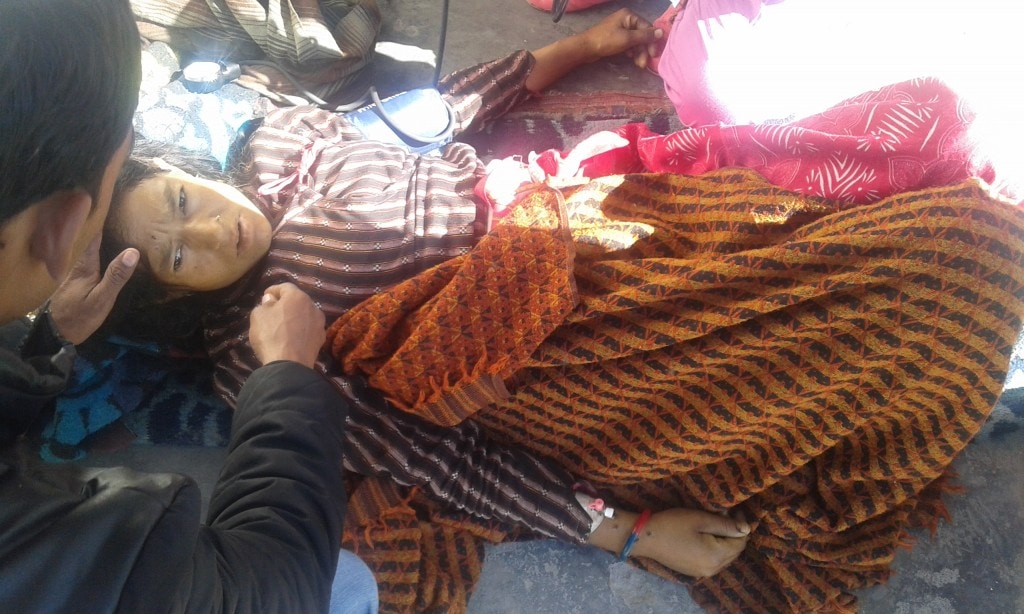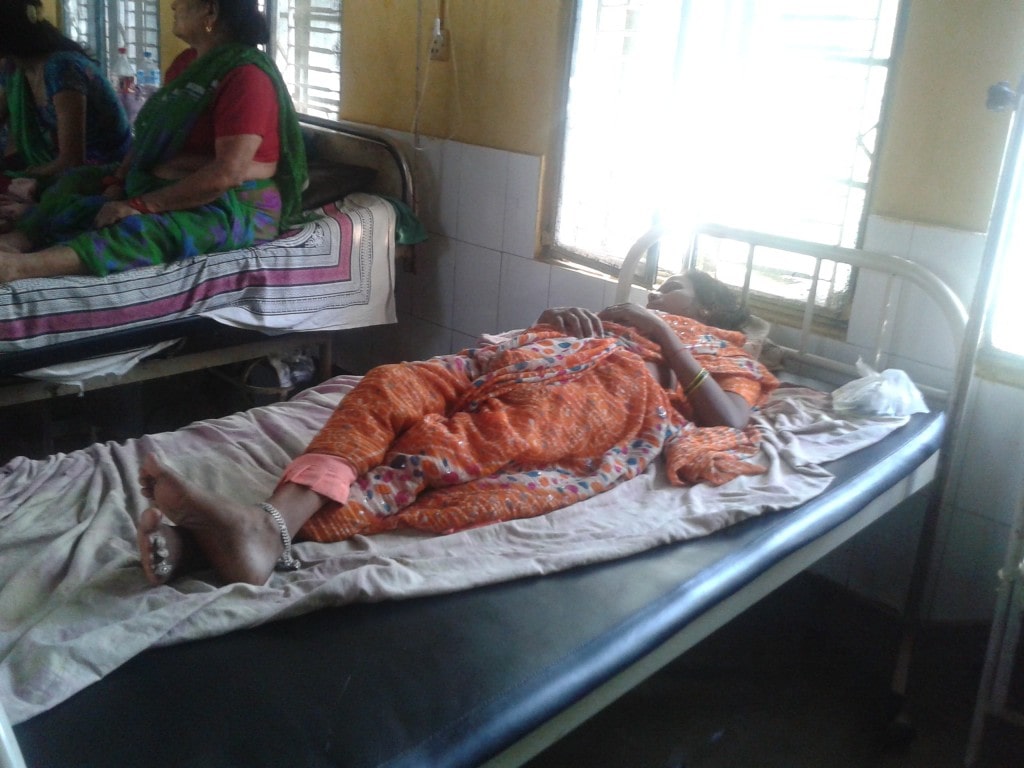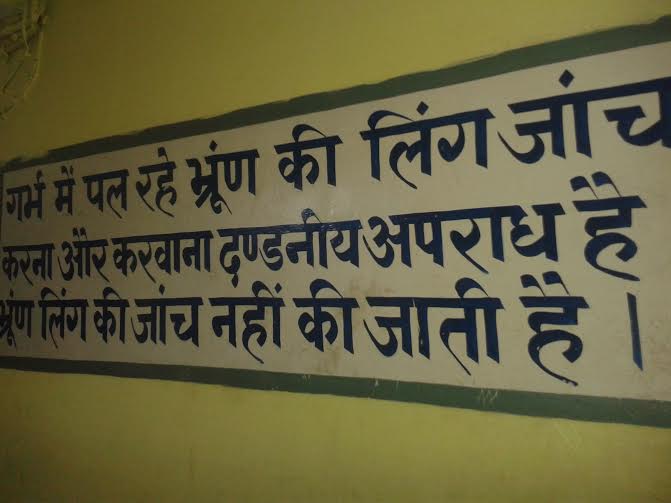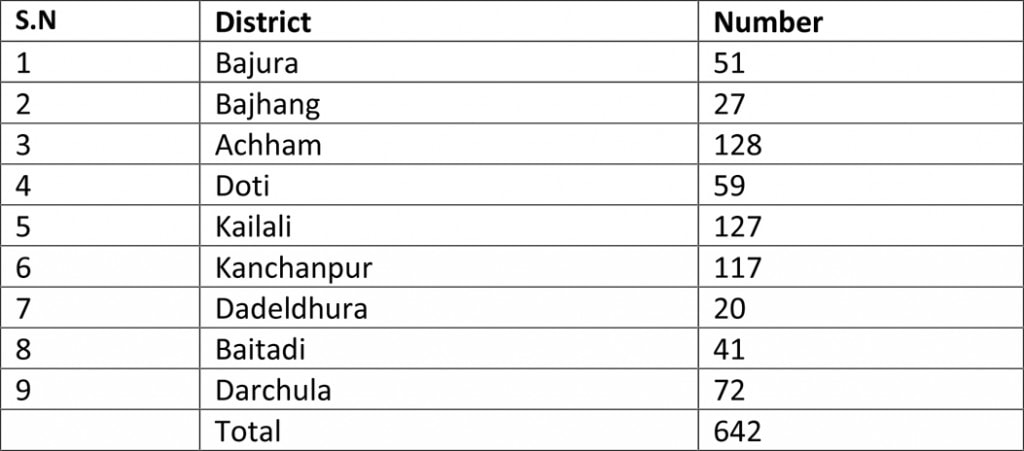Female feticide and unsafe abortion continues unabated in the Far-west Nepal.
PRAKASH SINGH- Centre for Investigative Journalism
In the spring of 2014 Manakala Saud, 35, of Nandegada in Achham died due to excessive bleeding caused by contraceptive pills. Saud had taken the pills after consulting local pharmacist, to terminate her pregnancy, but she ended up losing her life.
Woman brought in for treatment at Kolti Primary Health Post following complications due to consumption of contraceptive pills -Pics:Dr.Kularaj Shahi
In August, 2013 Rajmati Bhatti of Jhilari Pipladi, Kanchanpur also died due to excessive bleeding after taking contraceptive pills.
Hemu Shrestha is a nurse at the Kolti Primary Health Centre in Bajura, a remote hill district in the far-west. Over the years she has seen several women from the region, die or suffer immensely because of unsupervised attempts to end pregnancies.
‘Most women either have complications resulting from incomplete abortion or profuse bleeding that often leads to death.’ says Shrestha.
The problem is of epidemic proportion in the region. Every month Bayalpata Hospital in Achham handles around 30 cases of women facing health complications resulting from unsupervised abortion. Complicated cases in similar numbers from villages in Doti, Achham and Bajura are also referred to near-by Mahakali Zonal Hospital and Seti Zonal Hospitals each month.
Unsafe abortion practices are rampant not just in the remote mountains but also in the urban centres of Terai. Gita Shrivastva,30, of Dhangadi was lucky to survive the profuse bleeding after she took contraceptive pills at the suggestion of a local pharmacist. She was rushed to at Seti Zonal Hospital, where she was treated.
Rupa BK, staff nurse at District Health Office Bajura says, ‘backdoor’ abortions have become a big problem in the region as there is no mechanism to keep track of them. ‘ Those women who are malnourished are at higher risks of uterine prolapse, cancer and even death due to heavy bleeding.’ says BK.
Women in the remote districts have long relied on unsafe orthodox practice to abort pregnancies. But even with better access to public health care, they continue risking their lives by taking contraceptive pills without professional medical supervision.
‘These women are rushed to the hospital only when the pills fail and result in complications. The situation here is more dire than in other parts of the country.’ says Dr Ganesh Bahadur Singh, head of Seti Zonal Hospital.
Senior health assistant Tek Bahadur Khadka of Bajura’s District Health Post says, ‘There is general lack of awareness about safe family planning methods because of which women are unnecessarily risking their lives.’
Source: Regional Health Directorate, Dipayal
Illegal business, weak governance
Nepal’s abortion law permits women to safely terminate their pregnancies up to 12 weeks. Furthermore, the law mandates these procedures be carried out only in authorised health centres which are equipped with trained nurses and doctors for the purpose. The Safe Abortion Services Directive-2009 clearly mandates, health professionals and the clinics providing abortion services should be certified by local health and family planning division in their respective districts.
Woman undergoing treatment at Seti Zonal Hospital in Dhangadi after complications during unsupervised abortion
The Regional Health Division record shows only 36 health posts/clinics in the far-western region have been registered and authorized to carry out abortion. ‘ The registered clinics are mostly located in the urban areas, which is why women in the remote villages are forced to seek services in unauthorized clinics nearby.’, informed Bajura’s senior health officer Dipak Shah.
CIJ found local pharmacies in the villages across far-west, were illegally selling scheduled drugs like Mifepristone and Misoprostol, which are only supposed to be sold under strict medical prescription by authorized doctors. Many of the pharmacies selling these these drugs were being run by local health workers who supervised unauthorized abortions.
The drugs are easily available across, in the Indian border-towns, from where they are smuggled in to the region. ‘ No prescriptions are required to buy these contraceptive drugs around here. You can buy them in any quantity.’ admitted Binit Pandey who runs a pharmacy shop in Indian border town of Gaurifanta.
Authorities at Regional Drugs Management Division in Nepalgunj are aware about the extent of the problem but say, they lack of manpower for effective monitoring. ‘There are only three inspectors charged to monitor 24 districts. It is an impossible job.’ says Menu Shrestha, who heads the division.
Dead daughters
Besides unsafe abortion, districts in the far west Nepal have also recorded an increasing number of cases of female feticide. The deeply entrenched patriarchal society of the far-west often ostracize women if they don’t give birth to daughters. The husbands even abandon the mother and the daughter and remarry in hopes of having sons.
 We already had a daughter, and wanted our second child to be a son. So, when I became pregnant again, we took a test to determine the baby’s sex and aborted it after knowing that it was a girl.’ says Mina Nepali (name changed). ‘ It was a mutual decision and we did the abortion in India.’
We already had a daughter, and wanted our second child to be a son. So, when I became pregnant again, we took a test to determine the baby’s sex and aborted it after knowing that it was a girl.’ says Mina Nepali (name changed). ‘ It was a mutual decision and we did the abortion in India.’
While existing laws in Nepal and India prohibit sex determination test and sex selective abortion, it is widely practiced in several cities across Nepal and India. In Nepal the law permits abortion only until 12 weeks, but couples wait until 16 weeks to examine the sex of the fetus before aborting it.
Jamuna Thapa (name changed) of Bajura also went to Paliya in India to abort her pregnancy in the fifth month after determining baby’s sex. She was hospitalized for a week due to heavy bleeding during the procedure. ‘I already had three daughters. So, when I found this was a girl again, I aborted it and paid 8,000 rupees for the procedure.’
Nanda Rokaya (name changed) of Bajura has already undergone four abortions and spent around 30,000 rupees.
Santa Rokaya from Bajura believes women are under immense social pressure to give birth to a son, which is why they resort to such desperate measures. ‘ What do you do when your husband threatens to leave you, and your in-laws torture you?’, she asks. Local activist Rukmini Shah blames entrenched patriarchal values and illiteracy, and says years of campaigning have yielded very little change.
Nepali women frequenting the Indian cities for abortion has become so routine that rickshaw drivers in the bordering Indian towns offer to take them to the ‘right place’ without being asked. Alarmed at the growing notoriety of these clinics, even the Indian government has started awareness campaigns in the border towns. The local hospitals now have big messages boards (above) which read ‘sex selective abortion is a crime’.




